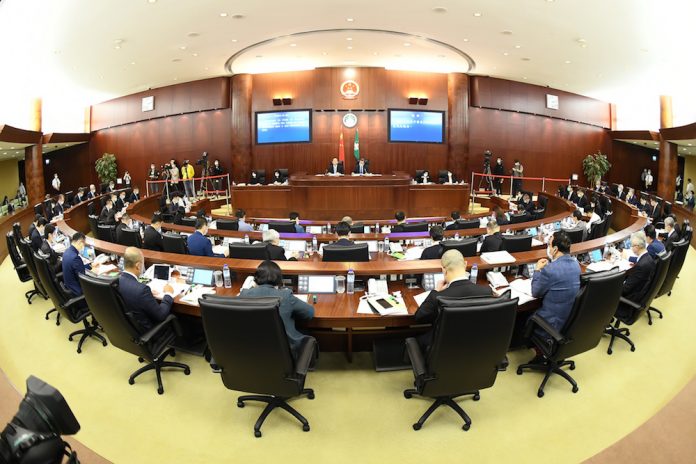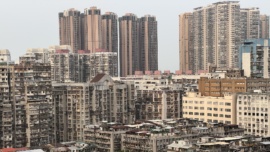A stock exchange? A financial centre? Traditional Chinese Medicine? Creative industries? Ho Iat Seng said what he thinks about the ’emerging industries’ and he has not revisited the ideas associated with Xi Jinping’s last visit. However, it left the door open to ground-breaking news.
MB June 2020 Special Report | Diversification now or never
Just two words, to be sure, but it was the first time that a Macau official, even more significantly a Chief Executive, hinted at a possibility that hitherto was considered nearly unthinkable. When Ho Iat Seng was asked about the possibility of allowing Macau’s casinos to engage in online gaming, the answer was: it is “being studied”.
The words of the Chief Executive, being a novelty, are not however an absolute surprise.
A few hours before Ho Iat Seng’s remarks, during the press conference that followed his maiden Policy Address, one of the most respected gaming scholars in town hinted at that.
“Even though the re-tendering of gaming concessionaires would not include the considerations of online gaming, the SAR government should start research and discussion about online gaming in the short-term,” said Macau Polytechnic Institute (IPM) Professor, Zhonglu Zeng, as quoted by Inside Asian Gaming.
Professor Zeng also added: “One of the biggest concerns is that online gaming is forbidden in mainland China, however, mainland China bans any kind of gambling, right? Macau is a special enclave which allows gambling in China, thus Macau also has the space to explore opportunities for online gaming.”
Zhonglu Zeng, President of the Asia Pacific Association for Gambling Studies, was actually just one of many experts who in recent weeks have come together to talk about the topic, as the Covid-19 crisis was taking a massive toll on the city’s core industry.
“Even though it is illegal, I hope to see the incidence of telephone betting in casinos” in Macau, warned in January David Green, founder of Newpage Consulting, a firm specialised in Macau gambling affairs.
“Online gambling is not likely to diminish dependency on tourism unless we use it as a step towards entering other services within the digital economy” – José Alves

In the same context, Jason Ader, managing partner at SpringOwl Asset Management and a former board member of Las Vegas Sands, told NBC that the ripple effect of the virus and fears of a pandemic, including quarantines and travel warnings and restrictions, should be a “ wake-up call ” for the Chinese government and casino interests throughout Asia that it is time to legalize online gambling.
Mr Adler used the numbers of the only Asian market where online gambling is legal: the Philippines: “Daily online gambling is up 90 per cent over the Lunar New Year holiday compared to last year. That’s an unbelievable number, and it raises the issue of whether land-based operators should be converging around the world with online operators. That’s really the growing trend.”
Professor Ji Chunli, from the Centre for Gaming and Tourism Studies at IPM, quotes data from Malta, “also a small economy like Macau, which has promoted the development of online gambling since 2004 to help the process of economic diversification and growth.”
According to Professor Ji, in 2018, Malta’s online gambling industry stood as the third-largest contributor to economic value-added, generated almost one-eighth of the total, and directly employed around 6,800 persons. “Besides, the online gambling industry has also helped to complement and create an activity for other ‘new economy’ activities in Malta, such as ICT and higher value-added activities,” he stated to Macau Business.
Professor José Alves from City University of Macau (UCM) goes on the same way: “Staying just on the online gaming I think is not worthwhile. We could create incentives for gaming operators to develop high-value digital competencies and diversify into other fields. However, I am not sure that the operators have that interest at this point.”
The Dean of UCM’s Faculty of Business underlines that “online gambling is not likely to diminish dependency on tourism unless we use it as a step towards entering other services within the digital economy.”
“Although Macau can’t develop online gambling blindly, it is necessary to pay attention to the development of the industry and carry out some research related to the online gambling industry. For example, how to effectively regulate online gambling to avoid its harmful effects; whether online gambling can promote the development of other industries, such as the information technology industry, artificial intelligence, etc” – Ji Chunli

Leona Li, Assistant Professor in Business Economics at the University of Macau’s Faculty of Business Administration agrees that “as Macau further develops its non-gaming elements and improves its overall tourism offering in both software and hardware, we can combine our effort of ‘smart city’ (which is a policy orientation and investment by our government) with ‘smart tourism’ development.”
Professor Li gives an example: “Electronic sports is currently a very attractive segment and an important contributor to local tourism/economy in a lot of places. If we are to invest and become a world-renowned destination of electronic sports competitions, we can not only substantiate the tourism sector development with international recognition, we can also consider developing in the related software and technologies in the longer term.”
“Horizontal diversification”
Ho Iat Seng addressed the matter in two minutes, but some have been patiently explaining why at least 10 years of economic diversification has failed to yield results.
Edmund Li Sheng, Associate Dean of UM’s Faculty of Social Sciences and Professor of Political Economy and Public Policy, sheds light on what he believes is the crus of the question.
“The main reason for this stagnation was because Macau followed the path of vertical diversification very closely, for which it achieved enormous socio-economic development, having created a high dependence on the gaming sector and related industries. The community and society have shown a low dynamic attitude and have lost the north, since the diversification of the non-gambling sectors has remained an inexperienced and long-term investment area, implying large amounts of capital,” Professor Sheng states.
The Macau-based scholar highlights the concept of horizontal diversification of the non-gaming economic activities.
“The problem that Macau faces is the lack of land. Hence, it is impossible for Macau to follow the Las Vegas vertical style. In contrast, horizontal diversification is more available for the small city. It means, Macau should diversify from casino gaming towards financial and other services with high value added and low land occupation,” he explains to Macau Business.
“In Macau, horizontal diversification is suitable for two reasons. On the one hand, as mentioned above, Macau is a small city with limited land resource. It is difficult for it to develop an outdoor tourism project. On the other hand, even non-gaming tourism activities such as opera performances are added in casinos, due to tourists’ enthusiasm for gambling, they will eventually become the vassals of gambling. In this case, it will only make the gaming industry more prosperous, the problem of vulnerability continues,” Professor Sheng concludes.
























